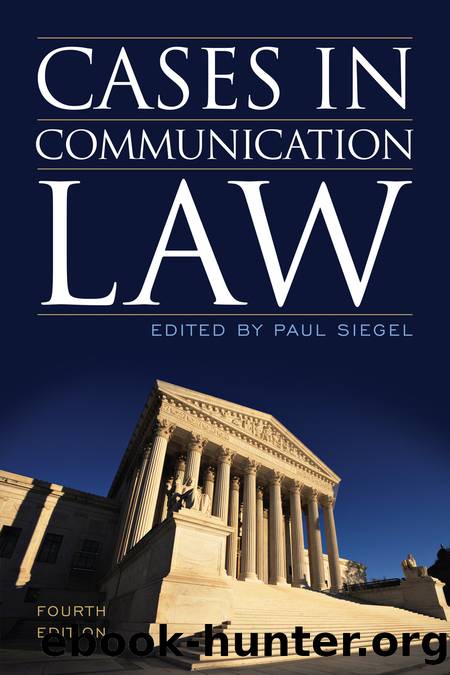Cases in Communication Law by Siegel Paul;

Author:Siegel, Paul;
Language: eng
Format: epub
ISBN: 1699236
Publisher: Rowman & Littlefield Publishers
POINTS FOR DISCUSSION
1. Does the government try to have it both ways? If radical Islamists were already charging that the military failed to provide bin Laden with a proper burial, wouldnât the release of at least the images most relevant to refuting that charge be advisable?
2. Should there be an automatic time limit (or at least, call for judicial re-review) of FOIA requests denied on national security grounds? Surely the photos at issue will be released someday, right?
Acker v. Texas Water Commission
790 S.W. 2d 299 (Texas 1990)
Justice Doggett:
The vital issue in this case is whether the decision making of a state agency in a contested administrative case should be done openly or secretly. We believe the law requires openness.
Charles M. Acker received a favorable recommendation from the hearings examiner at the Texas Water Commission on a requested permit for a waste-water treatment plant. Thereafter, during a recess of a public hearing conducted by the three-member Commission, Commissioners Hopkins and Roming were allegedly overheard conversing about this application in a restroom. This purported discussion concerned Ackerâs costs in complying with a city subdivision ordinance. When the public meeting reconvened, Commissioners Hopkins and Houchins voted to deny the application, and Commissioner Roming voted to grant it. Claiming a violation of the Texas Open Meetings Act, Acker brought suit seeking to set aside this order. The trial court granted Acker summary judgment based upon this asserted violation, but was reversed by the court of appeals on grounds that section 17 of the Texas Administrative Procedure and Texas Register Act [TAPTRA] allows private communications between agency members. We affirm the judgment, although not the reasoning, of the court of appeals and remand to the trial court for further proceedings.
The Open Meetings Act, enacted in 1967, [provides that] executive and legislative decisions of our governmental officials as well as the underlying reasoning must be discussed openly before the public rather than secretly behind closed doors. In order to effect this policy, this statute requires that âevery regular, special, or called meeting or session of every governmental body shall be open to the public.â A âmeetingâ includes any deliberation involving a âquorumâ or majority of the members of a governing body at which they act on or discuss any public business or policy over which they have control. Any verbal exchange between a majority of the members concerning any issue within their jurisdiction constitutes a âdeliberation.â When a majority of a public decision making body is considering a pending issue, there can be no âinformalâ discussion. There is either formal consideration of a matter in compliance with the Open Meetings Act or an illegal meeting. Our citizens are entitled to more than a result. They are entitled not only to know what government decides but to observe how and why every decision is reached. The explicit command of the statute is for openness at every stage of the deliberations.
The court of appeals created a gaping hole in the Open Meetings Act through the meaning accorded to the subsequent enactment of section 17 of TAPTRA.
Download
This site does not store any files on its server. We only index and link to content provided by other sites. Please contact the content providers to delete copyright contents if any and email us, we'll remove relevant links or contents immediately.
You Don't Own Me by Orly Lobel(1366)
Intellectual Property Strategy by John Palfrey(1322)
Hello, My Name is Awesome by Alexandra Watkins(1290)
Without Copyrights by Spoo Robert(1189)
Profit From Your Idea: How to Make Smart Licensing Deals by Attorney Richard Stim(1164)
Democracy of Sound by Alex Sayf Cummings(1152)
A Triumph of Genius: Edwin Land, Polaroid, and the Kodak Patent War by Ronald K. Fierstein(1127)
The Trademark Guide by Lee Wilson(1121)
World War 3.0 by Ken Auletta(1086)
The Copywriter's Handbook by Robert W. Bly(1085)
Data Protection: A Practical Guide to UK and EU Law by Carey Peter(1072)
Kafka's Last Trial by Benjamin Balint(1065)
BVR's Guide to Intellectual Property Valuation by Michael Pellegrino(1015)
Mass Media Law by Pember Don & Pember Don(1007)
Patent It Yourself: Your Step-by-Step Guide to Filing at the U.S. Patent Office by Pressman David Attorney(1000)
What They'll Never Tell You About the Music Business by Peter M. Thall(997)
Hello, My Name Is Awesome: How to Create Brand Names That Stick (BK Business) by Alexandra Watkins(993)
The Tech Contracts Handbook: Software Licenses and Technology Services Agreements for Lawyers and Businesspeople by David Tollen(985)
The New Censorship: Inside the Global Battle for Media Freedom by Joel Simon(957)
